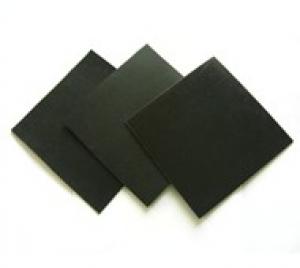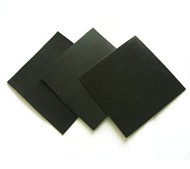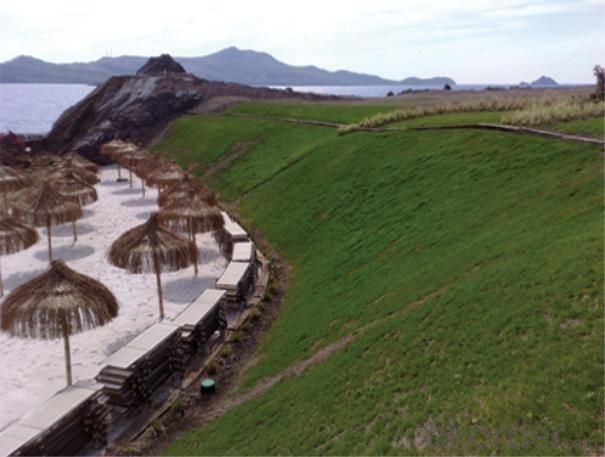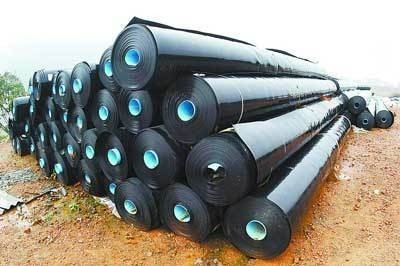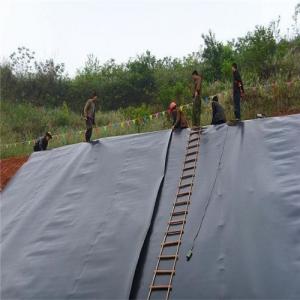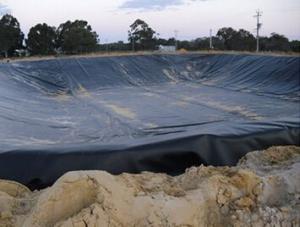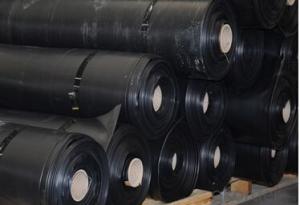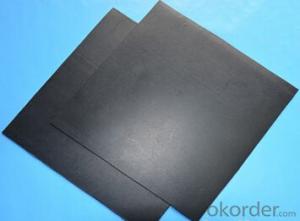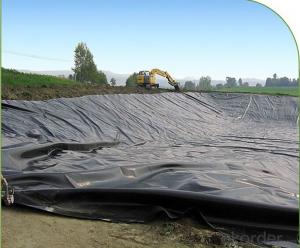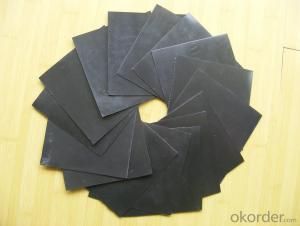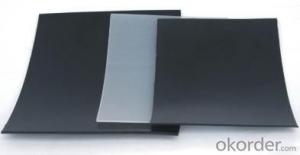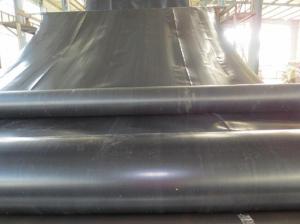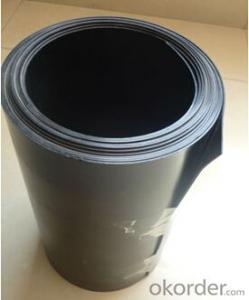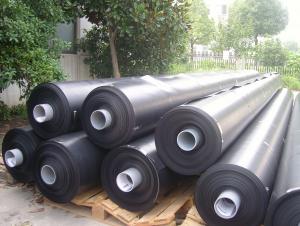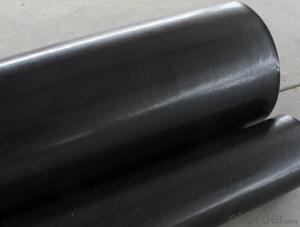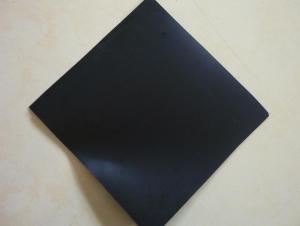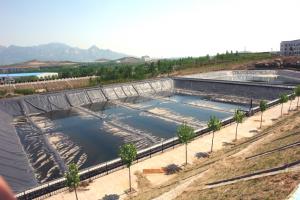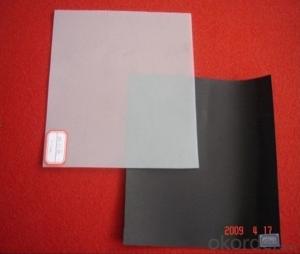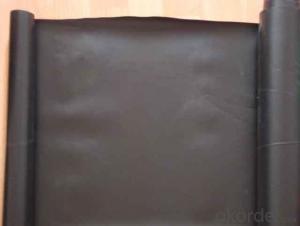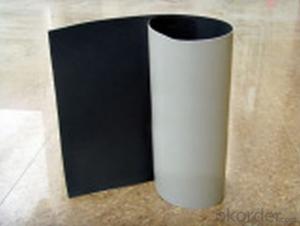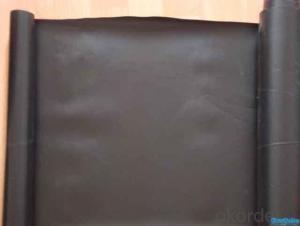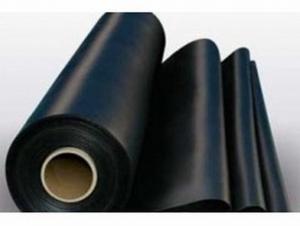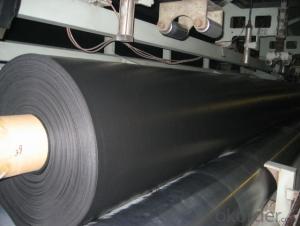Wholesale Geomembrane HDPE LLDPE Geomembrane for Building
- Loading Port:
- Qingdao Port
- Payment Terms:
- TT or L/C
- Min Order Qty:
- 10000M2 m²
- Supply Capability:
- 30000000 M2 Per Year m²/month
OKorder Service Pledge
OKorder Financial Service
You Might Also Like
Introduction of LDPE Geomembrane:
----Geomembrane including LDPE, LLDPE, HDPE, EVA, ECB and PVC geomembrane.
Application of LDPE Geomembrane:
---Prevent leakage disposal in waste burying field, waste water, or waste dregs disposing field.
River bank, lake dam, mine remaining, reservoir, tunnel, liquid storage pool(pit, mine)
Preventing leakage of subway, basement, tunnel, holes
Anti-slot leakage in roadbed and other groundsill
The plan direction laying of dam, the vertical direction laying for groundsill, used in the construction fence and waste material field.
Used in seawater or freshwater feed field.
Used in groundsill of road, highway, railway and waterproof layer of swelling clay and wet collapsed loess.
Preventing leakage on rooftop
Specification of LDPE Geomembrane:
Item | Test Value | |||||||
0.5mm | 0.75mm | 1.00mm | 1.25mm | 1.5mm | 2.00mm | 2.50mm | 3.00mm | |
Density (g/m2) | 0.939 | |||||||
Tensile Strength at Break(min) (MD/CN) | 13 | 20 | 27 | 33 | 40 | 53 | 66 | 80 |
Elongation (MD/CD) % | 800 | |||||||
Max 2% Modulus(N/mm) | 210 | 370 | 420 | 520 | 630 | 840 | 1050 | 1260 |
Tear Strength(N) | 50 | 70 | 100 | 120 | 150 | 200 | 250 | 300 |
Puncture Strength(N) | 120 | 190 | 250 | 310 | 370 | 500 | 620 | 750 |
Carbon Black Content(%) | 2.0~3.0 | |||||||
Elongation at Multiracial (%) | 30 | |||||||
Oxidative Induction time(min) | Standard OIT: 100 High Pressure OIT: 400 | |||||||
Oven aging at 85℃ | ≥35 | |||||||
UV Resistance | ≥35 | |||||||
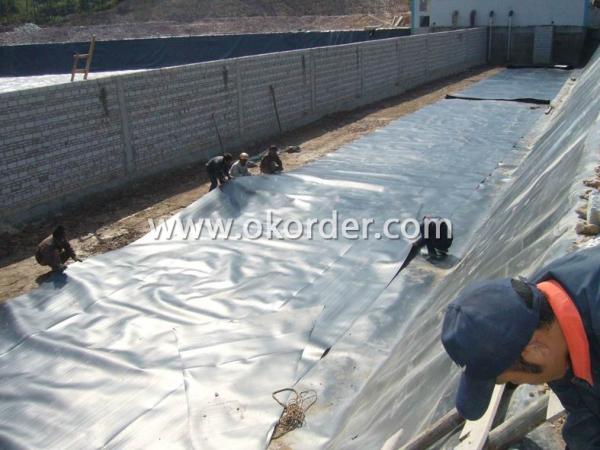
- Q: Are geomembranes resistant to electrical conductivity?
- Yes, geomembranes are generally resistant to electrical conductivity. They are designed to be electrically insulating materials, which means they have a low ability to conduct electricity. This property makes them suitable for various applications where electrical isolation is required, such as in containment systems for hazardous waste or in lining ponds and reservoirs. However, it is important to note that the electrical resistance of a geomembrane can vary depending on its composition and specific properties.
- Q: Can geomembranes be used in decorative pond installations?
- Yes, geomembranes can be used in decorative pond installations. They are often used as a flexible and durable lining material to prevent water leakage and provide a smooth surface for pond features such as waterfalls, fountains, and rock formations.
- Q: How do geomembranes perform in high wind conditions?
- Geomembranes are typically designed to withstand high wind conditions. They are made from durable materials that have high tensile strength, allowing them to resist wind forces. Additionally, geomembranes are often anchored or secured along their edges to further enhance their stability in high wind conditions. Overall, geomembranes are designed and engineered to perform well and maintain their integrity even in challenging wind conditions.
- Q: Are geomembranes resistant to puncture?
- Yes, geomembranes are designed to be puncture-resistant. They are typically made from durable materials such as high-density polyethylene or PVC, which provide excellent resistance against punctures from sharp objects or external forces. However, it is important to note that the level of puncture resistance may vary depending on the specific type and thickness of the geomembrane used.
- Q: Can geomembranes be used in road construction?
- Yes, geomembranes can be used in road construction. They are often used as a barrier between the subgrade and the aggregate base to prevent water infiltration and increase the durability of the road. Geomembranes can also be used to separate different layers of the road to prevent intermixing and improve the overall stability of the structure.
- Q: How to remove the film on the floor?
- The tile protective films can be divided into 3 categories. 1) Plastic film can be removed by hand or steel wool. 2) Anti-fouling agent packaging film can be removed by towel with white cement. 3) Tile wax protective film which can be removed by dry towel, electric diluent, banana oil, or talcum powder with white cement.
- Q: How do geomembranes prevent water seepage in fishponds?
- Geomembranes prevent water seepage in fishponds by providing a impermeable barrier between the soil and the water. These synthetic liners are highly resistant to water penetration, creating a watertight seal that prevents any leakage or seepage.
- Q: How do geomembranes handle chemical spills?
- Geomembranes are designed to handle chemical spills by providing a protective barrier between the spill and the underlying soil or water. These impermeable liners are resistant to various chemicals, preventing them from leaching into the environment. Additionally, geomembranes are typically installed with proper containment systems, such as secondary liners and collection sumps, to ensure that any spilled chemicals are safely contained and can be efficiently removed or treated.
- Q: What are the considerations for geomembrane selection in agricultural irrigation systems?
- When selecting a geomembrane for agricultural irrigation systems, several considerations need to be taken into account. These include the type and quality of the soil, the water source and its chemical composition, the climate conditions, and the specific requirements of the irrigation system. Additionally, factors such as durability, flexibility, puncture resistance, and compatibility with other components of the system should also be considered. Ultimately, the selected geomembrane should be able to effectively prevent water leakage, minimize evaporation, and withstand the demands of agricultural irrigation.
- Q: What are the uses of geotextiles?
- Geotextiles are new building materials. They made from synthetic fiber of high-molecular polymer, namely the dacron, acrylic, chinlon, etc. According to manufacturing method, geotextiles can be divided into two categories, namely the woven geotextile and non-woven geotextile. The geotextiles have functions of seepage control, filtration, dewatering, separation, reinforcement, protection, seal, etc. Compared with common stone and concrete, geotextiles have properties of low cost, simple construction?technology, short construction period, good anti-seepage effect, channel efficiency. Geotextiles can be used for filtration in dams and revetments, for separation and seepage control in channels, for separation and dewatering in roads, railways and runways, for reinforcement and dewatering in slopes, retaining walls and pavements, for treatment in soft grounds of the ports, causeways and wharfs, for separation and seepage control in landfills, ash dams of heat-engine plants and tailings dams of dressing mills. Geotextiles are now widely used in the field of construction of infrastructure and will be used in broader fields.
1. Manufacturer Overview
| Location | Shandong, China |
| Year Established | 1998 |
| Annual Output Value | Above US$ 20 Million |
| Main Markets | 20.00% North America 20.00% South America 10.00% Eastern Europe 10.00% Southeast Asia 10.00% Northern Europe 10.00% South Asia 10.00% Western Europe 5.00% Africa 5.00% Mid East |
| Company Certifications | ISO9001:2008 |
2. Manufacturer Certificates
| a) Certification Name | |
| Range | |
| Reference | |
| Validity Period |
3. Manufacturer Capability
| a) Trade Capacity | |
| Nearest Port | Qingdao Port,China |
| Export Percentage | 41-50% |
| No.of Employees in Trade Department | 5-10 People |
| Language Spoken: | English; Chinese; Russian; Spanish |
| b) Factory Information | |
| Factory Size: | Above 100,000 square meters |
| No. of Production Lines | Above 10 |
| Contract Manufacturing | Design Service Offered; Buyer Label Offered |
| Product Price Range | High; Average |
Send your message to us
Wholesale Geomembrane HDPE LLDPE Geomembrane for Building
- Loading Port:
- Qingdao Port
- Payment Terms:
- TT or L/C
- Min Order Qty:
- 10000M2 m²
- Supply Capability:
- 30000000 M2 Per Year m²/month
OKorder Service Pledge
OKorder Financial Service
Similar products
Hot products
Hot Searches
Related keywords
